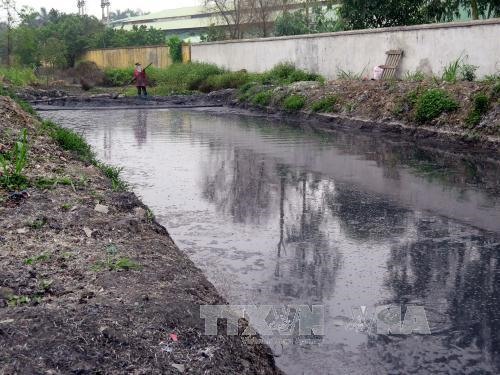Businesses discharge wastewater into irrigation canals
 |
| Artificial pond holding industrial wastewater from manufacturers located in the Tân Hồng industrial cluster of northern province Hải Dương.-VNA/VNS Photo Mạnh Tú |
Locals have to put up with an unbearable stench, while clean water is not available for their rice fields, most of which are in the flowering stage and need large amounts of water.
The water in canals has turned a thick black colour, and duckweed – which can usually flourish even in water contaminated with industrial waste – did not seem to be able to grow in this water, a telltale indication of the pollution level.
Phạm Văn Ấm, head of the Tân Phong Cooperative in Tân Hồng commune, expressed his concern that 300 ha of rice in the commune might suffer serious water shortages in this critical period, leading to reduced output.
According to the provincial irrigation department, the pollution affects not only the immediate surroundings of the industrial cluster, but the polluted waters will be carried along the networks of canals to other communes in Bình Giang District, impacting hundreds of farmers and thousands of hectares of crops.
Earlier this year, the department worked with the provincial Department of Natural Resources and Environment to conduct water quality tests in irrigation canals under its jurisdiction and the results showed that most are polluted, with the amount of pollutants 1.1 to 8.7 times higher than national standards.
Aside from industrial discharge, other activities compound the problem, for example, polluted water from upstream areas in Hà Nội and Hưng Yên and locals washing fertiliser and pesticide packages in the canals.
According to Nguyễn Thị Hải Hoà from Bình Giang District’s environment division, Tân Hồng industrial cluster features nearly 20 manufacturers, specialising in plastic recycling, garment and textiles, agricultural machinery production and package production, among others.
In follow-up inspections after water quality tests, authorities discovered a number of manufacturers who violated environmental laws, especially in terms of improper wastewater treatment before releasing it into the environment. The provincial environment department issued fines of VNĐ60 million (US$2,640) to each offender, and ordered all these polluting manufacturers to halt operations, Hoà said. However, the manufacturers ignored the order and continued their activities, only a bit more surreptitiously, she added.
Abovementioned administrative fines were not enough of a deterrent, local authorities admitted, and have requested a change of policy from provincial authorities, allowing heavier sanctions to polluters, including licence revocation and forced relocation.
According to the provincial irrigation department, the only way to clear the pollution is to wait for rising tides, and then the sluice gates will be opened to allow the tidewater to flood in, diluting the polluted water in the area and flushing contaminants out. At the moment, however, local residents can only hope for heavy rain that will bring much-needed relief, even temporarily, to their rice fields.
Bắc Hưng Hải irrigation system – spanning over three northern provinces (Hải Dương, Hưng Yên, Bắc Ninh) and the capital city of Hà Nội – is designed to provide water for 110,000 hectares of rice, crops and industrial plants; 12,000 hectares of livestock and poultry husbandry and aquaculture cultivation; in addition to water for 3 million people and industrial complexes and craft producers in a 4,300 ha region.
What the stars mean:
★ Poor ★ ★ Promising ★★★ Good ★★★★ Very good ★★★★★ Exceptional
Latest News
More News
- Vietnamese businesses diversify amid global trade shifts (February 03, 2026 | 17:18)
- Consumer finance sector posts sharp profit growth (February 03, 2026 | 13:05)
- Vietnam and US to launch sixth trade negotiation round (January 30, 2026 | 15:19)
- NAB Innovation Centre underscores Vietnam’s appeal for tech investment (January 30, 2026 | 11:16)
- Vietnam moves towards market-based fuel management with E10 rollout (January 30, 2026 | 11:10)
- Vietnam startup funding enters a period of capital reset (January 30, 2026 | 11:06)
- Vietnam strengthens public debt management with World Bank and IMF (January 30, 2026 | 11:00)
- PM inspects APEC 2027 project progress in An Giang province (January 29, 2026 | 09:00)
- Vietnam among the world’s top 15 trading nations (January 28, 2026 | 17:12)
- Vietnam accelerates preparations for arbitration centre linked to new financial hub (January 28, 2026 | 17:09)
















 Mobile Version
Mobile Version